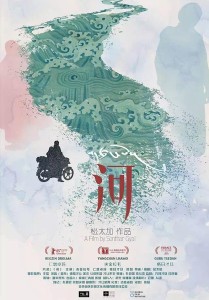River
གཙང་པོ | 河
China, 2015, colour, 16:9, 93 mins.
Director: Sonthar Gyal 松太加.
Rating: 7/10.
Small but affecting look at a Tibetan Chinese herder’s family via the daughter’s eyes.
Tongde county, Qinghai province, China, the present day, early spring. Tibetan sheep herder Guru Tsedan (Guru Tsedan) and his young daughter Yangchan Lhamo (Yangchan Lhamo) travel by motorbike across the grasslands to visit his father, Thubten Chospel (Kheydrup). A respected former lama (when he was known by the name Sarje Kyab), he lives like a hermit in a hillside, meditating, and has been visited by everyone else in the village apart from his own family. When they arrive, however, Guru Tsedan sends Yangchan Lhamo up alone to see his father, whom for some reason he still refuses to see. Later, though snow is still falling and the ground is hard, Guru Tsedan takes his family to the summer pasture site early, despite the complaints of his pregnant wife Regzin Drolma (Regzin Drolma) about the bumpy ride. A ewe is killed by a wolf, and the family cares for its young lamb, feeding it milk until it’s ready to join the flock. They also plant barley for harvesting later in the year. Wuth only her teddy bear for company, Yangchan Lhamo becomes attached to the lamb, and tells her mother that she doesn’t want a brother or sister. When the time comes for the lamb to be returned to the main flock, Yangchan Lhamo is unhappy. And soon after it rejoins the flock, the lamb goes missing. The father’s lucky charm, a black oval bead called a dzi, also goes missing. Thinking it may have been stolen by Rabo, the village thief, Guru Tsedan rides off to confront him.
REVIEW
A delicately observed drama built out of everyday events in the life of a sheep herder’s family, River གཙང་པོ | 河 is a vast improvement on the first feature by director Sonthar Gyal 松太加 – the formulaic and film-schooly The Sun Beaten Path 太阳总在左边 (2010), a desert-set Tibetan/Buddhist meditation of the kind so beloved of international film festivals. There’s about the same, minimal amount of dialogue in the new feature but it’s much more naturally employed and the characters (again played by non-professionals) are more sympathetic and less schematic. A tiny film that’s sustained by small behavioural moments, and by a warmth between the characters that is never expressed in words, River gives some hope that Sonthar Gyal may develop a separate film-making personality from his longtime mentor Pema Tseden 万玛才旦, on several of whose films he’s worked as a d.p. or art director (The Silent Holy Stones 静静的嘛呢石, 2005; The Search 寻找智美更登, 2009; Old Dog 老狗, 2010).
Set in the high grasslands of the director’s native Qinghai province, China – specifically in Tongde county, part of a Tibetan autonomous prefecture – the film sketches three seasons (spring, summer, autumn) in a sheep herder’s family, largely through the eyes of the young daughter. Devoted to her father, bullied by local kids, but finding company with her teddy bear and an orphaned lamb she helps raise, Yangchan Lhamo is not so much the film’s emotional centre as the prism through whom the audience observes the family. On the one hand is the herder’s wife, pregnant with another child whom Yangchan Lhamo says she doesn’t want as a brother or sister, and on the other is the herder himself, who conceals some deep hurt with his father, a respected lama-turned-hermit. The (kind of) resolution of their conflict is the film’s only real drama, but it’s movingly handled in very simple terms, more through faces than dialogue, plus small physical moments. In a needlessly arty device, the grandfather’s face is hardly seen, but his presence is felt throughout the film, as the herder broods over a past slight.
Guru Tsedan 格日才旦 is okay as the herder, though has little else to do apart from stoically driving his motorbike across the grasslands and looking preoccupied. Regzin Drolma 仁增卓玛 is more accessible as his wife, trying to balance her pregnancy, everyday work and the emotional needs of her daughter. But it’s young Yangchan Lhamo 央金拉毛 who dominates the film, as a kid with private and public worlds who slides between obstinacy and secrecy, obedience and naughtiness, without ever becoming cute.
One of the small pleasures of River is that, though made by a Tibetan Chinese, it doesn’t rely on the usual ethnic and religious overload for its content or drama: these could be any nomads, anywhere. In the same way, the clean photography by Wang Meng 王猛 (The Sun Beaten Path; China Affair 她们的名字叫红, 2013) is good-looking without overdoing the natural beauty of the grasslands setting. Editing by the experienced Kong Jinlei 孔劲蕾 also doesn’t dally unnecessarily, bringing the film in at a just-right hour and a half.
CREDITS
Presented by Beijing Garuda Film & TV Culture Communication (CN), Beijing Huangying Huanyi Media Film Culture (CN).
Script: Sonthar Gyal. Photography: Wang Meng. Editing: Kong Jinlei. Music: Dukar Tserang. End titles music: Tenzin Choegyal. Art direction: Taktse Dondrup. Sound: Dukar Tserang, Zhang Lei.
Cast: Yangchan Lhamo (Yangchan Lhamo, daughter), Regzin Drolma (Regzin Drolma/Rindrol, mother), Guru Tsedan (Guru Tsedan, father), Kheydrup (Thubten Chospel, aka Sarje Kyab, grandfather), Sonam Dorje, Drukgyal Tsering, Phagpa Kyab, Kalo Kyi, Dradul, Chaktar, Sangpe, Lhamo.
Premiere: Berlin Film Festival (Generation: Kplus), 11 Feb 2015.
Release: China, tba.
(Review originally published on Film Business Asia, 12 Feb 2015.)
